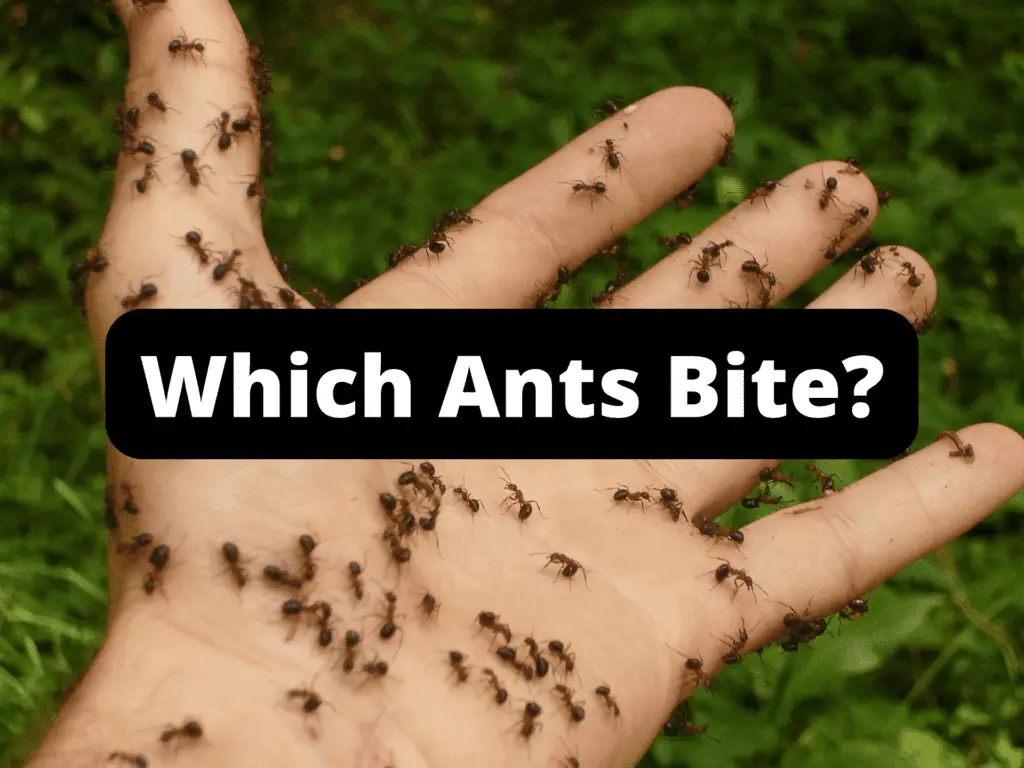There are numerous different sorts of creatures that may bite, yet the reasons for their attacks are sometimes mistaken.
Biting insects come in a variety of forms, this includes (our friend) ants.
There are around 12,000 different ant types worldwide, including over 700 in the United States alone.
Is it true that all ants bite?
We will give a deep dive into this,
Be careful though! When you think you’ve been bitten, you may have been stung.
Bites and Stings from Insects
The question “Do most ants bite?” may seem to be pretty straightforward, though it’s actually a little more complicated than that.
Most ants, on average, have biting mouthparts with which they may use to work through whatever they’re consuming.
On the other hand, most house-infesting ant types are so tiny that their fangs are incapable of injuring people if they bite. (Our skin is actually quite thick)
It really is the stinging that certain ants deliver that causes all the commotion, as we’ll discuss further below.
It’s possible that these stings are misinterpreted as bites.
Ants often sting when they believe they are in danger or they’re just seeking to obtain food.
We will clear up these misconceptions, and also dive deep into which ants bite.
Some ant stings are fatal and can kill.
What is the definition of an ant bite?
A lot of people get this wrong, an ant bite happens when an ant latches onto human skin (or prey) with its mouth.
A bite is a little different from a sting since you will only experience stings from females.
Some ants do a little bit of both actually, this includes Fire Ants
Fire ants bite the skin and then use their stinger to inject poison.
Some ant species do not bite or sting!
Their main defense is actually spraying formic acid.
Who is bitten by an ant?
Ant bites and stings can happen to anybody who comes close to ants, especially if you are around their colonies!
Ants by nature are protective of their homes.
An easy way to not get stung or bitten is to avoid their homes.
When Ants build nests, it’s very obvious – you’ll see them.

Ants are more common in places that have:
- Good food resources
- High-quality soil
- Low predators
- Sunlight
- Low counts of traffic (walking, hiking, etc.)
Are house ants venomous?
All ants can bite.
Their mouths have developed to be incredibly strong, helping them bite whatever they’re consuming.
Several house-infesting ant types are so tiny that their fangs are incapable of injuring people if they sting.
Instead, it’s the stinging that ants deliver that causes pain.
Growing up I was always told that ants bite.
The question “Which Ants Bite?” is slightly misleading.
Ant Sting Identification
Fortunately, many ant bites and stings are usually nothing to get worried about.
However, they are guaranteed to be annoying and uncomfortable.
Ant bites and stings are often followed by redness, discomfort, burning, slight swelling, and itching, irrespective of the type responsible.
Give them some time, they will go away on their own.
Here are some ants to stay away from since their stings or bites are painful!
We’ve also indicated where they usually build their colonies so you may avoid their wrath!
Fire ants
If their colony is disturbed, ants bite.
When a human is bitten by one fire ant, he or she is likely to experience many stings from different ants.
Their stings cause a swollen welt to develop into a white wound.
Bites also can cause severe allergic reactions in certain persons.
Be careful with these guys, usually, they travel in high numbers, if you’re seeing one – there are probably thousands around.
Velvet ants
Female velvet ants are the only ones who sting.
This is because they don’t have wings, making them easy to identify them from the males.
Female ants would usually flee if they are approached, but they will bite if they are touched.
Harvester ants
If their colony is disturbed, harvesting ants will bite.
Harvester ants produce extremely painful bites, and people who are sensitive to bug stings must be very cautious of them.
Don’t let this keep you away from keeping ants as pets!
Field ants
If a field ant’s colony is disturbed, they bite.
As they bite, many will spray formic acid onto the area, which can be pretty unpleasant.
Quite a unique reaction from these guys.
Ant bites or stings can cause allergic responses.
Hymenoptera bites often cause less adverse responses than stings.
There are four types of allergic responses to Hymenoptera:
Reaction on the ground
The most typical symptom of an ant bite is a localized response.
Localized discomfort, itch, inflammation, swelling, and thickening of the skin are all symptoms.
The edema is generally under 5 cm and therefore is urticarial in nature.
The duration of a local response is shorter than 24hrs.
If you’re experiencing this, just wait it out.
Localized large-scale reaction
A prominent local response of pain, redness, blistering, swelling, and itching comprises a large part of the body bigger than 10 cm around the sting site.
The intensity usually rises around 1 – 2 days and continues on for 7 – 10 days to decrease.
A mild systemic response
For the (unfortunate) 1% of ant stings, a minor systemic response affecting the surface and intestinal microbiota occur.
Flush, itching, angioedema, urticaria, or inflammation in areas far from the sting or a widespread distribution are some of the skin signs.
Mild sickness, diarrhea, or abdominal cramps are all signs of the gastrointestinal system. Moderately severe responses include dizziness, breathlessness, and nausea.
A severe systemic response
Primary symptoms of a systemic inflammatory reaction to ant poison include
- Angioedema (particularly the voice box),
- Flushing
- Difficulty breathing
- Bronchospasm
- Heart palpitations
- Hypoxemia
- Lightheadedness
- Stomach pain
- Vomiting
- Muscle cramps
In addition, anaphylactic shock, unconsciousness, as well as respiratory and cardiovascular arrest are all possible outcomes.
Yikes
Ant bites and stings are detected in a variety of ways.
Ant bites/stings are diagnosed solely on medical signs and pertinent ant contact, or potential and visibility.
Therefore, it is necessary to report for diagnostic testing only when a significant systemic response is observed.
Skin tests are not required for a strong local reaction since the danger of anaphylaxis from a second ant sting is incredibly low.
Apart from being aware of ant habitats, how can I avoid ant bites?
Keeping your property clear of stinging/biting species is one approach to safeguard yourself, your home, and your animals from such ants.
It is also vital to get your property inspected on a regular basis by someone who can notice indicators of an outbreak or a nesting.
Once you come upon a nest while wandering around your home, don’t try to destroy it yourself.
The colonies can go on alert and launch a significant attack.
Remember, ants really only bite when disturbed or frightened!
How can you work to try to control ants?
Being watchful and controlling the ant colony population around your house is the most significant way to prevent being bitten by ants.
However, when it comes to fire ants, one may minimize your chances is by paying enough notice to your environment.
When you’re outside and make sure you don’t put your foot through a nest.
I’m sure everyone remembers this from when they were a kid.
Ants may be tough to control as there are so many different kinds, and they may reside in vast colonies.
Baits work for certain species, while others may need to be treated as a whole colony.
Furthermore, identifying ant species might be difficult, but it is critical for selecting the best treatment strategy.
What do I do if I’m bitten by an ant?
- It’s best not to rub it. You can boost the histamine reaction by rubbing the bite.
- To prevent the poison from expanding, clean the bite(s) using soap and warm water and use a cool towel.
- Antihistamines, anti-inflammatories, or 1% hydrocortisone lotion are indicated as the best treatments.
- If the symptoms are lingering or you have a serious reaction, you should seek medical attention right away.
What is the best way to deal with ant bites and stings?
The sort of reaction to ant bites/stings determines the management.
Wipe the ants off your clothing first, then wash the afflicted area.
To relieve irritation and minimize inflammation, apply a cold compress.
Local and large-scale local reactions are treated differently.
The following are examples of immediate management:
- Antihistamines for itching and urticaria are taken orally.
- If you’re in pain, take analgesics like paracetamol.
- If the inflammation is sluggish to diminish, a brief term of steroidal anti-inflammatory drugs may be used.
- Remove apparent ant nests, stop going barefoot, & wear pants and a full-sleeved shirt when participating in outdoor recreation.
Long-term planning:
- In locations where poisonous ants are common, insect avoidance is crucial.
- When going outside, put on your socks and shoes.
- When gardening, use work gloves.
Procedure for systemic reactions, both moderate and severe
The following are examples of immediate management:
- Injection of adrenaline (also known as epinephrine)
- Anaphylaxis patients require primary life care.
- Referral to the emergency room right away
- Antihistamine injection will be used as a supplement.
- See a doctor, you can never be too safe.
Long-term planning:
- Adrenaline self-injection stylus and teaching on how to do it for individuals suffering systemic responses
- An allergy expert recommends skin tests and venom therapy.
- Immunotherapy also isn’t required for a widespread urticarial response in women under the age of sixteen.
- Discuss with your doctor on a custom plan, especially if you’re highly allergic.
Other Common Ant Questions
There are a ton of different questions when it comes to ants.
We did the research and have some posts that answer some of the most well-known ant questions.
See those different posts in this list here:
- Can Ants Chew Through Plastic?
- Do Ants Need Light to See?
- Different Types of Ants
- Can An Ant Get Drunk?
What happens if an ant stings or bites you?
Adults (particularly those over 45 yrs old) are more likely than youngsters to have a severe allergic response as a result of such an ant/insect sting.
However, a very small percentage of allergic reactions are classified as serious reactions.
After one re-bite, just under 1 percent of ant bites lead to a more serious response.

